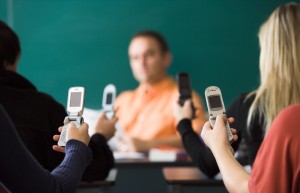 In episode 10 of Drunk Ex-Pastors, “Free Whiskey, Bad Teachers, and Sex Education”, I relate a story about my daughter having her phone taken away in class last year. The issue was that, while her regular teacher allowed phone usage in class, the substitute she had that day did not, so her phone was confiscated. To retrieve the phone, I had to make a visit to the school, which ended up with me inadvertently making a more public stand against The Pledge of Allegiance than I had intended. Again, the full story is available in the podcast below. (My thoughts on The Pledge of Allegiance are also available here.)
In episode 10 of Drunk Ex-Pastors, “Free Whiskey, Bad Teachers, and Sex Education”, I relate a story about my daughter having her phone taken away in class last year. The issue was that, while her regular teacher allowed phone usage in class, the substitute she had that day did not, so her phone was confiscated. To retrieve the phone, I had to make a visit to the school, which ended up with me inadvertently making a more public stand against The Pledge of Allegiance than I had intended. Again, the full story is available in the podcast below. (My thoughts on The Pledge of Allegiance are also available here.)
However, this brings up another question: should mobile phone usage be allowed in class? I have two boys about to graduate high school and their experience has been a mixed bag. Some teachers have made it clear that if they even see a phone, it will be taken away. Some teachers have encouraged students to get on their phones to look something up. (Much like each student having their own computer in class.) And some teachers haven’t had any rules about it and seem to ignore students using their phones entirely. (Unless, of course, the phones make noise or vibrate – no one likes that.)
There are a few things to consider, but I’d like to make a disclaimer first: I have a mobile phone, which I use regularly. (Ironically, rarely for phone calls.) However, I think we’d all be better off if mobile phones didn’t exist. I view mine as a necessary evil, and although I enjoy having a mobile phone at times, I’m pretty concerned that my “smart phone” is actually turning me into a “dumb person.” (Let’s not even get into the potentially negative health effects of these handheld electromagnetic wave emitters.)
Now, having said that, mobile phones are here to stay, and if you think the technology is pervasive now, the same functionality will soon be in your watches, your glasses, your cars, etc. Avoiding a discussion on whether or not this is a good or a bad thing (since it is an inevitable thing), how are teachers to deal with it? It’s already difficult enough for a teacher to catch a student using their phone. What happens when the phone is being worn on their wrist, or viewed through their glasses?
There are all kinds of things to consider. Students could use phones to cheat. However, students have always found a way to cheat if they want to. Students may text other students in class. However, students always find ways to communicate and what is more distracting, a text that makes no noise or a note being passed through five people? The teacher can spend the class period trying to stop students from being distracted by their phones, but what’s more distracting: a student reading something online, or a teacher constantly interrupting class to stop students from reading things online? A phone may keep a student from paying attention in class, but frankly, I don’t remember paying attention in class much and all I had was a pen to doodle with. If I had had a phone, I could have potentially learned something or at least watched a cute cat video.
There are the positive things to think about as well. Educators used to talk about the day when every student would have a computer at their disposal. An iPhone (or a Samsung Galaxy, or whatever!) is currently more powerful than any computer was twenty years ago. Smart phones can be used as calculators, timers, encyclopedias, research tools, even as my daughter uses hers in class when allowed, with headphones to listen to music while working quietly on a project and avoiding distractions from the environment around her.
In the end, I don’t know what the answer is, or even if there is a good answer. It reminds me of the music industry’s fight with Napster fifteen years ago though. The music industry wasn’t ready and didn’t have the foresight to see that they were fighting a losing battle. File sharing wasn’t going away, it was only going to become more prevalent. Instead of finding ways to adjust, the music industry fell behind and has been playing catch up to technology ever since. Schools and educators may be in the same boat. Mobile communication devices aren’t going away. They’re only going to become more prevalent. Should educators embrace the technology and use it to their advantage in the hopes of minimizing the negative uses of these devices, or should they continue to fight what is probably a losing battle and end up playing catch up for decades while their class of students collectively LOLs at them on a group chat?

 Embezzle, Coma, Repeat
Embezzle, Coma, Repeat On Pee-Pees and Hoo-Haws
On Pee-Pees and Hoo-Haws Scientists and Superstitious Simpletons
Scientists and Superstitious Simpletons Nobody Puts Brody in a Corner….
Nobody Puts Brody in a Corner….